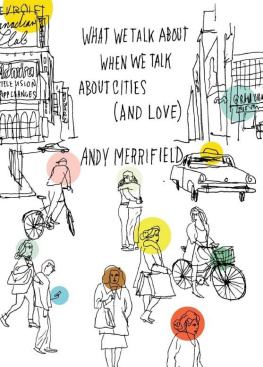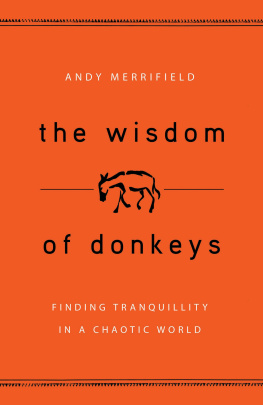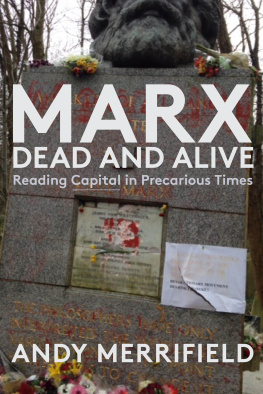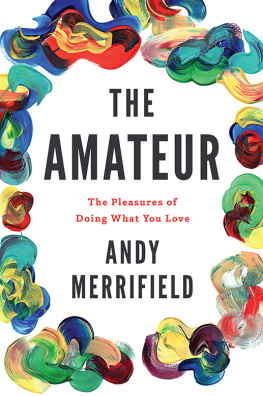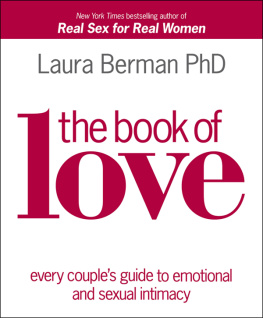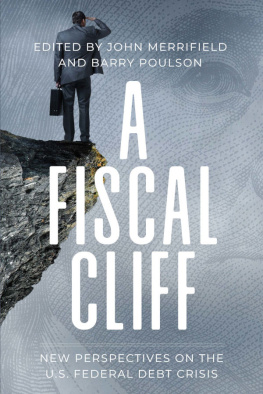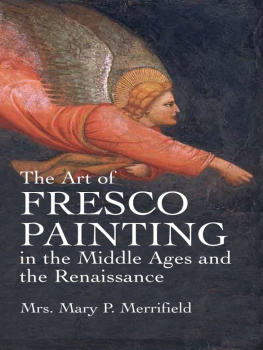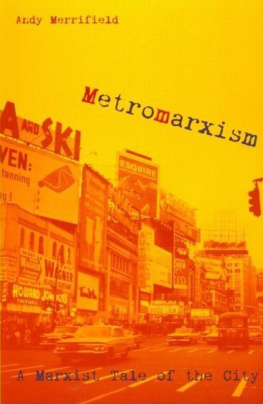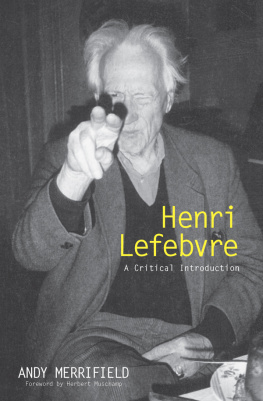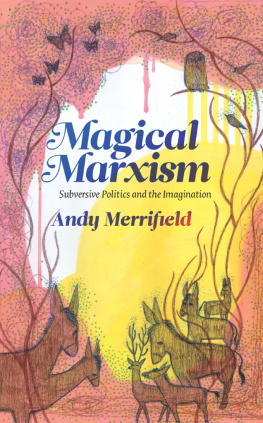


2018 Andy Merrifield
Published by OR Books, New York and London
Visit our website at www.orbooks.com
All rights information:
First printing 2018.
All rights reserved. No part of this book may be reproduced or transmitted in any form or by any means, electronic or mechanical, including photocopy, recording, or any information storage retrieval system, without permission in writing from the publisher, except brief passages for review purposes.
Cataloging-in-Publication data is available from the Library of Congress.
A catalog record for this book is available from the British Library.
Typeset by Lapiz Digital Services, Chennai, India. Printed by BookMobile in the United States and CPI Books Ltd in the United Kingdom.
Paperback ISBN 978-1-682191-43-9 ebook ISBN 978-1-682191-44-6
For C.
& heartfelt thanks to Colin R.
I mean, Im just talking, right?
Raymond Carver
I ve read and admired plenty of short stories from plenty of great writers but theres one that stands out as an all-time favorite. Its a regular source of nourishment: What We Talk About When We Talk About Love by Raymond Carver.
Maybe its the old romantic in me. Im not sure. I mean, the way Carver deals with powerful feelings and complex human desires, the way he helps us understand them, talks about them honestly; the way he writes them down, thinks them through, his economy of observation, his brevity and plain-talking. In everything he wrote, Carver never gave definitive answers. Most of his stories dont have storylines. Their endings trail off, usually poignantly. And yet, theyre soaring acts of inventiveness, leaving us with a quiet and gracious sense of hope.
Carver acknowledged his debt to short story masters Anton Chekhov and Isaac Babel, even if his war stories and survivor tales bed themselves down in more mundane terrain: not so much the ruined tedium of the provincial Russian estate as workaday small-town America. Carver was an unassuming chronicler of the flawed lives of ordinary people, their struggles and yearnings, our struggles and yearnings. He never wrote epic tomes nor tackled grand historical themes.
What We Talk About When We Talk About Love is probably his best-known story. Published in 1981, it quickly knocked people out, knocking me out a decade later when I stumbled upon it as a graduate student in Baltimore. By then it was an American classic and Carver a martyred legend. Its setting is typically stripped down, typically centering on sharp dialogue and booze. Carver finally beat the bottle in the early 1980s, got remarried (to poet Tess Gallagher), found contentment, recognition, autumnal happiness, loveonly to have lung cancer strike, seeing him off in 1988, aged fifty. And did you get what / you wanted from this life, even so? Carver wrote in a final poem, Late Fragment. I did / And what did you want? /... to feel myself / beloved on the earth.
Carvers own title for What We Talk About When We Talk About Love was Beginners. But his longtime editor, Gordon Lish, hacked fifty percent off and renamed it. The Lish label stuck. Carver, appalled at first, wanted to pull his story but then had a change of heart and kept Lishs honed version. Lish hacked away at many other Carver stories over the years, stripping them down to bare chicken bones. After Carvers death, Tess Gallagher republished her late husbands restored takes, bundling them together under the banner Beginners, letting readers finally glimpse Carver at full length and full speed. Its a hit-and-miss affair. Sometimes the longer versions are richer than Lishs edited ones. Other times Lishs edits seem right.
What We Talk About When We Talk About Love sees two couplesMel and Terri, and Nick and Lauradrink gin around a kitchen table. They get on to the subject of love, its nature, what it means to each of them, what it once meant. As evening sets in, and the room dims, they get progressively drunker, more maudlin. What we hear is intense talk, a memorable encounter deeper and more probing, maybe even more disturbing, than any Platonic symposium. The kind of love Im talking about, says Mel, is love where you dont try to kill people. What do any of us really know above love, he says. It seems to me were just beginners at love. There was a time when I loved my first wife more than life itself. But now I hate her guts. I do. How do you explain that?
Terri says Mel is into spiritual love. Terri once dated a guy called Ed who loved her yet did try to kill her. We lived like fugitives, Terri says. Until Ed killed himself. He drank rat poison but lived. His teeth pulled away from his gums and stuck out like fangs afterward. Then he shot himself. His head swelled up to twice its normal size and he died two days later. I just wouldnt call Eds behavior love. Thats all Im saying, honey, says Mel. It was love, Terri says. Sure, its abnormal in most peoples eyes. But he was willing to die for it. He did die for it.
What about you guys? wonders Terri, questioning Laura and Nick. Does that sound like love to you? Nick isnt sure; he seems more realist than romantic. Im the wrong person to ask, he says. I didnt even know the man. Ive only heard his name mentioned in passing. I wouldnt know. Youd have to know the particulars. But I think what youre saying is that love is an absolute. You know the kind of love Im talking about, Mel says. Physical love, that impulse that drives you to someone special, as well as love of the other persons being, his or her essence, as it were. Carnal love and, well, call it sentimental love, the day-today caring about the other person.
The gins flows. A toast to love. To true love, Mel cries, raising his empty glass. Honey, Im just talking, he says. All right? I dont have to be drunk to say what I think. I mean, were all just talking, right? They lose the sun; twilight encroaches. I could hear my heart beating, Carver has Nick muse. I could hear everyones heart. I could hear the human noise we sat there making, not one of us moving, not even when the room went dark.
F or a while Ive dreamed of putting this story to work, making it work where my heart beats, in my world. Ive wondered if I could ever write something using Carver as a loose guide, his story as a sort of template, dialoging about what we mean when we talk about cities, what cities have meant to me, meant to others. Urban studies is something Ive talked and written a lot about for decades. Thats been my world, my universe. But Id like to try to give the conversation a different spin, another voice, another idiom. Id love to talk about cities and love.
What are we talking about when we talk about cities? Do we need to know the particulars, the details? Can we talk about cities in the absolute, get at their essence, beneath the particulars? Is it possible to love a city? To hate a city? Can we talk about cities in a carnal sense? Sentimentally? Can we urbanists toast true love? Does true love last? Might we fall out of love with a city? Might we find true love in the city? Id always wanted to talk about romantic love and the city but wasnt sure how.
In a strange way, though, Id already seen What We Talk About When We Talk About Love find an urban staging: through the dark drama of a fascinating film, Birdman. Alejandro G. Irritus 2014 Oscar winner moves inside and beyond Carvers story, doing so in New York, starring Michael Keaton as a washed up Riggan Thomson. Twenty-years back, Riggan was the Hollywood action hero Birdman. Now, flabbier, aged, more desperate, hes directing, acting, and partially bankrolling a Broadway production of Carvers classic story. Hes out to reclaim artistic integrity, or else affirm it for the first time, to rejuvenate a flagging career as well as a failing marriage. His relationship with his daughter is fraught. The critics are out to slam him. Hes on the psychological edge, staring into a deep abyss, yearning to fly high again.
Next page
